The following is a press release released by The University of Victoria and Raincoast Conservation Foundation February 13, 2020.
Against a backdrop of British Columbia’s recent consideration of UNDRIP into legislation, and visible conflict between Canada and Indigenous Nations/hereditary leaders over pipeline development (e.g. Coastal Gas Link and Trans Mountain projects), a new peer-reviewed analysis of Canada’s recently passed Bill 69 (now the Impact Assessment Act) in the journal FACETS details how federal decision-making processes are ‘inherently at odds’ with authentically engaging Indigenous Knowledge (IK).
“Indigenous knowledge systems are extensive, complex, and deeply rooted in the land. Canada’s environmental assessment processes must engage with Indigenous Knowledge,” said co-author Nick XEMŦOLTW̱ Claxton, Assistant Professor at the University of Victoria, and elected Chief of the Tsawout Nation. For Dr. Claxton, who represented Tsawout Knowledge Holders in federal environmental assessment processes related to proposed Northern Gateway and Trans Mountain pipelines, this work also included recounting of professional and personal experience as he faced federally-appointed panel-members.
Infographic: Obstacles and limitations to engaging Indigenous knowledge in federal environmental assessment processes equitably and authentically.
Lauren Eckert, Raincoast Conservation Foundation Fellow and Vanier Scholar, University of Victoria (UVic) PhD candidate, and lead author of the study, added: “Environmental Assessment processes have the potential to generate environmentally-sound, socially-equitable decisions across Canada. But without fundamental shifts in the way current policy relates to, engages, and recognizes the rights of Indigenous peoples and their knowledge, outcomes may continue to lead to conflict between federal and Indigenous governments.”
The review concludes by acknowledging the growing list of environmental assessments in Canada that were led by Indigenous Nations themselves, citing these and collaborative environmental assessment efforts as potential ways forward.
“Indigenous Nations that are leading their own environmental assessments are able to do so according to their own laws, beliefs and worldviews and are able to make decisions about their lands,” added Claxton.
Background
Researchers at the University of Victoria, Raincoast Conservation Foundation, West Coast Environmental Law, and the University of Guelph analysed the newly-passed Bill C-69, now the Impact Assessment Act, as well as 19 peer-reviewed papers that had examined previous environmental assessment acts in Canada. The team identified some “surmountable” obstacles, recommending for example technical and cross-cultural training programs and timeline accommodations. Other obstacles, such as the enduring effects of colonization and perceived knowledge incompatibilities, they concluded to be fundamentally limiting to the meaningful inclusion of IK in environmental assessment processes.
Citation
Eckert LE, Claxton NX, Owens C, Johnston A, Ban NC, Moola F, and Darimont CT. 2020. Indigenous knowledge and federal environmental assessments in Canada: applying past lessons to the 2019 impact assessment act. FACETS 5: 1–23. doi:10.1139/facets-2019-0039












